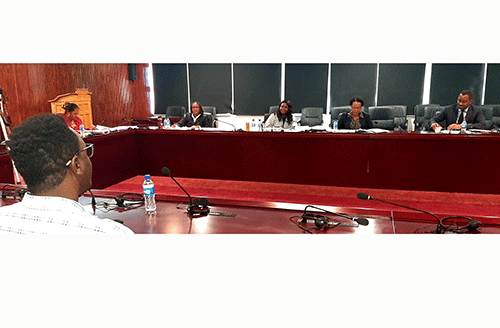Edward Mumbuu
Aspiring candidates for positions of electoral commissioners of the Electoral Commission of Namibia (ECN) identified its lack of voter outreach and civic education between elections as loopholes in the electoral law.
There was a strong perception that the ECN only swims into public consciousness in the year leading up to elections, while an avalanche of ideas emerged on how it can improve.
This analysis could be deduced from a marathon of interviews for the three vacancies of election commissioners, which saw 15 candidates present their cases as to why they are best suited on Monday.
A new chairperson to replace Notemba Tjipueja, whose time at the ECN’s helm is up after two terms, will be identified.
The ECN is looking for three commissioners, two of whom must be female.
Arguing her case, Elsie Nghikembua - the only candidate who forms part of the current commissioners - explained how voter apathy is linked to the lack of civic education.
“The Act refers to continuous voter registration and at the same time the Act indicates that [continuous voter registration] can be suspended. My question is, under what circumstance can it be suspended?”
“ECN is expected to come up with its own structure and appoint its own staff but these staff members are public servants and yet are expected to be accountable to the commission,” she pointed to a contradiction.
Nghikembua then posited what a credible commissioner ought to be in terms of integrity, impartiality and professionalism.
“We are not politicians. Stay out of the political space,” she cautioned.
Echoing similar sentiments was Vilyo Ndapopiwa.
“What is the role of the commission between elections? The Act must be amended to allow continuous voter registration,” he said.
According to him, Namibian voters are currently in limbo over the type of voting method the country will use in 2024, following the ruling that electronic voting machines (EVM) without a paper trail are unconstitutional.
“Is it EVMs or ballot papers? Preparation should be in advance. We should not panic in 2024,” he said.
Meanwhile, Ellison Tjirera opined that the electoral law is comprehensive and must be implemented to the letter.
“All systems and processes around the election and commission deal with impartiality and neutrality. You can’t be a person of dodgy character as you deal with the process through which the wishes and aspirations of Namibians are expressed,” Tjirera said.
Lawyer Rachel Mundilo took issue with the filling of vacancies, particularly when an incumbent dies while in political office three months before the next election, making reference to the death of Landless People’s Movement councillor for the Keetmanshoop Urban constituency, Maxie Minnaar, last year.
At the time, ECN opted not to hold a by-election to fill the vacancy, citing duration and financial implications, a situation that created a leadership vacuum.
“The ECN thought it was prudent at the time not to fill the position at the time even though it was provided for under the Act. This is an area that certainly needs to be looked at,” she said.
The youngest of the interviewees was 25-year-old Munolwisho Ipangelua, who said the Act’s loopholes must be addressed to avoid unnecessary legal challenges and misinterpretations.
Ipangelua pointed to the Popular Democratic Movement’s decision to change its National Assembly list shortly after it secured 16 seats in the 2019 general election.
“Political parties can submit a list but they can still amend it after the election. It means those people [added to the list] are not voted for by the people,” she said.
“The last election was a testimony to the separation of powers between the three branches of the State,” Emmerentia Leonard said, before suggesting that loopholes in the Act must be looked at, especially the confusion surrounding the independent candidate issue.
She said a successful candidate must lead by example as they will be the mirror of ECN. “Do the right thing even when nobody is watching,” she said.
Generally, most candidates agreed that Namibia’s young democracy was indeed a beacon of hope, one worthy of emulation by other nations.
“Namibians have political tolerance, there is freedom of speech and our election systems are firmly in place,” said Francina Kendjeele.
The 15 candidates were tested on experience in electoral or political processes, integrity, recommendations to the Act, conflict resolution abilities, ability to deal with an ethical dilemma and professionalism.
-Nampa


